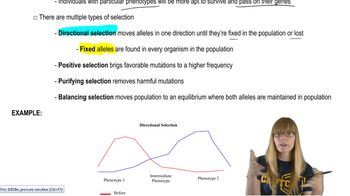Textbook Question
Write a short essay contrasting how these concepts may differ between bacteria and eukaryotes.
453
views

 Verified step by step guidance
Verified step by step guidance



Write a short essay contrasting how these concepts may differ between bacteria and eukaryotes.
What is a spontaneous mutation, and why are spontaneous mutations rare?
Why would a mutation in a somatic cell of a multicellular organism not necessarily result in a detectable phenotype?
Why is a random mutation more likely to be deleterious than beneficial?
Most mutations in a diploid organism are recessive. Why?
What is the difference between a silent mutation and a neutral mutation?